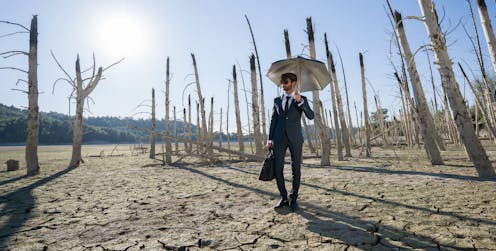Climate change hits indebted businesses hardest, new research suggests
- Written by Huan Kuang, Assistant Professor of Finance, Bryant University

Climate change poses the biggest risks to the most vulnerable people[1], and the same is true for businesses: Highly leveraged companies – those that have accumulated too much debt – are uniquely susceptible to climate shocks. That’s what we found in a forthcoming study in The Review of Corporate Finance that analyzed data from more than 2,500 U.S. publicly listed companies[2] over 16 years.
As professors who study climate finance[3] and corporate governance[4], we wanted to understand how climate change affects businesses, and how stakeholders[5] – people who have a stake in a firm’s success, such as consumers, employees and investors – respond to it.
So we and our colleagues Sadok El Ghoul[6] at the University of Alberta and Omrane Guedhami[7] at the University of South Carolina conducted a study to examine how climate risk affects indebted companies.
We found that climate change delivers a one-two punch to highly leveraged firms by intensifying the costs that stakeholders impose on them.
Consider consumers. Researchers know that climate change can push people to mix up their purchasing patterns – by buying greener products, for example, or by engaging in boycotts. And while evolving consumer preferences pose a challenge to all businesses, it’s harder for a company that’s deep in debt to adapt.
Our study suggested as much. Two years after facing intense climate change exposure, highly indebted firms saw sales growth fall by about 1.4% on average, we found. In monetary terms, that translates into an average US$59.7 million loss per company.
Climate change also worries investors, we found. Companies exposed to climate risk face the threat of financial and operational disruptions that may drain lenders’ funds, particularly for firms already burdened with high debt. By examining capital issuance within our sample of companies, we found that climate exposure reduced firms’ net debt issuance – meaning new debt minus retired debt – by around $457 million per firm on average. This is an additional hurdle for indebted businesses trying to raise money.
Why it matters
Researchers have long known that indebted companies are at greater risk of product failures and losing market share[8] when economic conditions go south[9]. Having too much debt can even force companies out of business, as some analysts contend happened with Toys R Us[10].
Our research suggests that climate change, which the World Economic Forum predicts will endanger about 2% of global financial assets by 2100[12], will push already shaky companies to the brink. It underscores the immense and asymmetric effects global warming will have on businesses – and the reality that the most vulnerable firms are set to endure the worst.
What’s next
Our study highlights the disproportionate impacts of climate change on financially fragile businesses. Moving forward, we plan to explore the influence of climate change on firms’ business behaviors, particularly in terms of their ethical conduct.
Regarding climate solutions, one of us (Huan Kuang) has shown how companies can use innovation to reduce their climate vulnerabilities. In a working paper[13] co-authored with Bing Liang[14] of the University of Massachusetts Amherst, every 1% increase in climate-related innovation – as measured by patent data – was found to reduce firm-level carbon emissions growth by around 100,000 metric tons.
However, indebted firms may not rush to invest in new technologies without some prodding. That means policy incentives will be key to success, and further research is needed to determine what they should look like.
Climate change could also have more complicated economic effects than many people realize. For example, if it forces companies that aren’t viable out of business, that would be a good thing for the economy – at least in theory, as one of us (Ying Zheng) explored in a recent paper[15] on a related subject.
Many questions remain unanswered, but it’s already clear that climate change will have important and multifaceted effects on the future of business. We encourage other researchers to investigate further.
The Research Brief[16] is a short take on interesting academic work.
References
- ^ most vulnerable people (doi.org)
- ^ more than 2,500 U.S. publicly listed companies (papers.ssrn.com)
- ^ climate finance (www.bryant.edu)
- ^ corporate governance (www.bryant.edu)
- ^ stakeholders (www.investopedia.com)
- ^ Sadok El Ghoul (apps.ualberta.ca)
- ^ Omrane Guedhami (sc.edu)
- ^ losing market share (doi.org)
- ^ when economic conditions go south (doi.org)
- ^ happened with Toys R Us (www.washingtonpost.com)
- ^ Paul Hennessy/NurPhoto via Getty Images (www.gettyimages.com)
- ^ about 2% of global financial assets by 2100 (www3.weforum.org)
- ^ a working paper (dx.doi.org)
- ^ Bing Liang (www.isenberg.umass.edu)
- ^ in a recent paper (doi.org)
- ^ Research Brief (theconversation.com)







